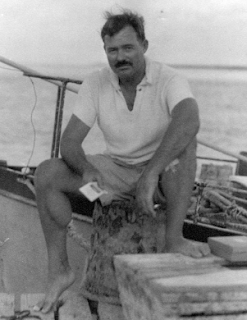Ernest Hemingway and poet and writer Robert McAlmon
at the bullfights in Madrid
Dear Ernest,
1925 was certainly an action packed year for you!
The month of April saw you pitching in to help out with Ernest Walsh's quarterly publication, The Quarter, to help get it out the door and published. You wrote Ezra Pound about it, "...and the continued activity of myself working like a son of a bitch to get Walshs magazine into the and off the press. Walsh put it my hands as a friend to help him outa his mechanical difficulties. Two hundred and sixty four pages and fifty reproductions can present considerable difficults when being printed by printer hitherto only done job printing."
At the same time you were wrestling with Walsh's publication and an inexperienced printer, you were struggling with your own issues. Having sent In Our Time off to your publishers, Boni and Liveright, you then found yourself going back and forth with the publisher over the stories that comprised In Our Time. At the same time you were being courted by Maxwell Perkins, from Charles Scribner's Sons, Publishers.
Throughout the exchange of letters between yourself and Boni Liveright I detect that the restraints, that Liveright was working to put on your work in order to make it "publishable" in their eyes, were a point of some irritation for you - sometimes more, sometimes less. Throughout your correspondence with Liveright it never feels like you are able to be truly comfortable with their approach to you or your material.
Your letter to writer, John Dos Passos, dated April 22, 1925 reflects the beginnings of a long and colorful friendship as well as your discomfort with your publishers, "Jesus I wish you were over here so we could get drunk like I am now and have been so often lately... You're a good guy, Dos and I wish to hell you were here... I sent back the signed agreement to Liveright on the 1st of April about and they were to send me the $200. but it hasnt come yet. Nor any word from them. A Mrs. George Kauffman is here and she claims they want to cut it
You close your letter to Dos Possos with, "Dont let them cut it. Tell Liveright not to be a damned fool.
As colorful as your letters are to your literary friends, your letters back to your parents are as comparatively conservative and dry, focusing on fishing, an overview of your writing accomplishments, and their grandson, Brumby.
You write to your father, "I do hope you will get some fishing. We plan to go to Spain June 25 for a mo or 6 weeks. Get ten days of fishing in the North. I have a commission to write a book on bull fighting for a German publisher and will follow the corridas from Pamplona July 7-13 down to Sragossa, Madrid and Valencia. I will be in the ring some of the time studying the business from close to but if you hear any reports of my being hurt discount them and don't worry as I will take good care of myself."
Compare what you wrote above with what you wrote to Gertrude Stein and Alice B. Toklas, while on your trip to Spain, on July 16, 1925, "We have had a fine time and no bad hot weather and seen Belmonte cogida-ed and he is not so bad, and had a bull dedicated to us and Hadley got the ear given to her and wrapped it up in a handkerchief which, thank God was Don Stewarts. I tell her she ought to throw it away or cut it up into pieces and send them in letters to her friends in St. Louis but she wont let it go and it is doing very nicely."
Dear Hem, as you begin your long love affair with the running with the bulls, so too do you initiate relationships with various literary and creative figures that will influence you in many, many ways. You count, among your friends, associates, and confidants the likes of Sherwood Anderson, American novelist and short story writer; George Antheil, American avant-garde composer; Sylvia Beach, owner of the Left Bank Paris bookstore Shakespeare and Company; John Dos Passos, American writer and author; F. Scott Fitzgerald, American novelist and short story writer; Zelda Fitzgerald, American writer and painter; Lewis Galantiere, journalist, translator of French literature and playwright; Christian Gauss, professor of Modern Languages at Princeton University; Alyse Gregor, novelist and managing editor of the Dial; Jane Heap, co-editor of the Little Review; Eugene Jolas, journalist, poet, translator and editor; Harold Albert Loeb, American writer and editor; Archibald MacLeish, American poet and writer; Robert Menzies McAlmon, American poet, fiction writer, and publisher; Edith Moorhead, painter and influential Scottish suffragist; and the list goes on, and on, and on.
It's impressive the level of immersion you've achieved in your art, in the literary world at large and in Paris in particular. In my lifetime I can only name a handful of people who have achieved the notoriety or fame that those in your general circle of influence have achieved, and you at the "ripe old age" of 26. You, my dear friend, are in for the ride of your life.
I'm looking forward to seeing what the future holds for you. I just hope you can survive the meteoric effects of the life of immersion you've chosen.
Wishing you all the best,
Warmest Regards,
Betsy


